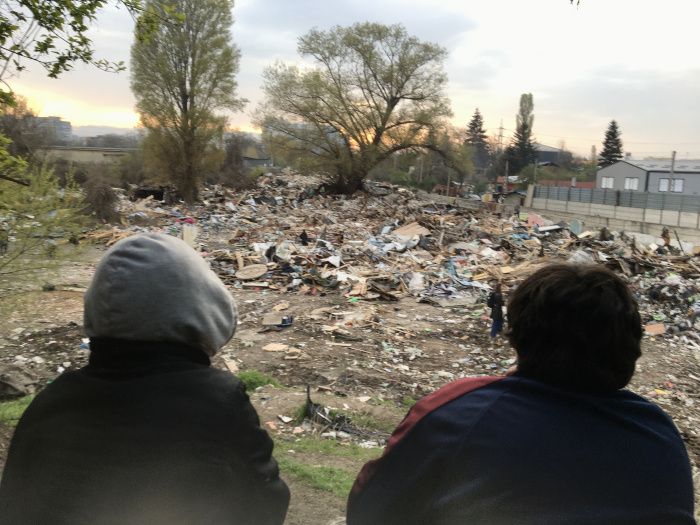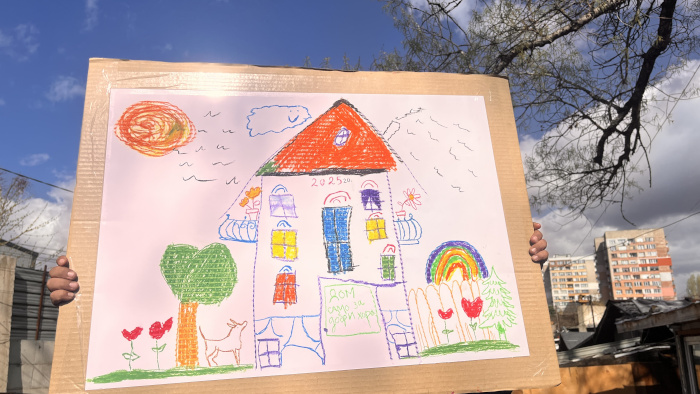Who Will Bear Witness to Our Experience?

![]() Reading time 6 minutes
Reading time 6 minutes
For the past five years the ATD Fourth World team in Sofia, Bulgaria, has been working with the Roma community in the sugar factory neighbourhood, a working-class district in the north-west of the capital. In 2019, the municipality went ahead with a partial destruction of Mahala, the Roma part of the district. Thirty families lost their homes and were rehoused in a temporary housing centre, where they are still living to this day. Now it has happened again.
Imminent destruction
On 14th March the deputy mayor arrived at Mahala with a significant police presence to announce the imminent destruction of their homes in just a few weeks’ time. From that day onwards, families lived in fear of losing everything. They started gathering their belongings and stopped sending their children to school. The lack of a definite date and any official documentation led to all sorts of rumours. Would they come on 28 March? The 11 April? The 14?
A few people didn’t believe it would happen at all and carried on with their lives as they had always done. But others started taking action. Two parents spoke on the radio to voice their concern for their future — they had nowhere to go! In answer to the journalist’s question “What would you like to say to the mayor?” Boïko replied. “I’d like to ask him how he can sleep at night knowing he’s about to put 200 people out on the street.”

Every means available
The ATD Fourth World team worked with the families to explore every means available to alert the relevant authorities and other organisations. In partnership with a legal organisation specialising in the protection of rights, they initiated legal proceedings that would be heard by the European Court of Human Rights. On 10 April, the families protested outside Parliament. In the words of Marin, leader of the demonstration and originally from the Mahala district, “You know, when we Roma people go out to protest, it’s a matter of life or death.” On 11 April, the European Court of Human Rights published a decree calling for a stop to the destruction of Mahala.
All-night vigil
On 14 April, which fell during Holy Week, the parents of Mahala held an all-night vigil to which the ATD Fourth World team was invited. They lit a fire in the small district square and gathered round. “It’s usually something we do when someone dies”, the parents explained. “It’s a night beyond the limits of time, which awakens old memories, and is marked by moments of tears, dancing and singing.” The vigil lasted until 5 o’clock the next morning. That was the moment when everything changed — the moment when 238 police officers arrived to take over the streets of Mahala.
This is how Vassia, a 37-year-old inhabitant of Mahala and father of three children, described the day when his entire neighbourhood was destroyed — a neighbourhood built on public ground over many years and inhabited by several generations of Roma families.
“At 5.30 a.m. came the arrival of excavators, police, water cannons and gendarmerie. They told us to evacuate the area. The police were very violent. They stood a metre away from us and would not let us take anything with us. They kept on telling us to leave our homes and stopped us from taking even the bare essentials. They spent all day demolishing the place. More than 30 to 40 houses were destroyed.
“Our neighbourhood has existed for around 100 years. My grandmother is 78 years old and was born here. My mother still lives here. My father died here about five months ago. We’ve grown up here for generations.
“We have three children. The youngest is still at school, although his schoolbag, textbooks, exercise books, and pens are buried under the rubble of our walls. The eldest is already working; he has no choice, he has to help out. As for the middle one, he’s not really interested in school. Now that we’re all outside, under the open sky, he’ll probably have to start working too.”
Still no suitable rehousing solution
It has now been two months since the families have been without any suitable option for rehousing. There is no resolution. Just silence. Vassia believes that a solution can be found, but with no communication from the other side, they are powerless.
“There are currently around 25 tents. The people are literally living among the ruins of their own homes. Around 10 to 15 people are sleeping in the local evangelical church, on the ground, on sheets, in whichever way they can. These are mostly people who are sick and families with young children, who cannot spend the night outside.”
Sotir, aged 23 and father of a three-year-old child, tells us a similar story:
“They’ve offered us accommodation at a temporary housing centre. It’s worse there. Communal toilets, illness, fear. My wife doesn’t dare go to the toilets. And we have to pay for it half of our salary. That isn’t help; it’s a prison. They say that we’re living off the state. But in reality, it’s the state that keeps us in poverty to control us. We work. We pay for electricity, water, everything we need. But they don’t even give us a chance. We can’t take out loans, we can’t rent an apartment. As soon as they find out that we’re Roma, it’s over.”
The council has defended itself, claiming that the shanties it destroyed were illegal and posed a danger to the public.
With regard to this accusation of illegality, Sotir responds:
“That’s the most painful thing. If they were illegal, then why did we have electricity meters? We have electricity bills that we’ve paid regularly. The state cannot give me a bill each month and then tell me, ‘You don’t exist.’ It’s hypocritical. They tolerate you when you’re a customer, but they get rid of you when it’s not convenient for them. The land belongs to the council, so why haven’t they sorted the question of legality for decades? Back then, they allowed our grandparents to move there, and now we’re illegal?”
When asked what he hoped would happen next, Vassia had this to say:
“The most difficult bit is the mornings; you wake up and you don’t know what to do. You can’t wash your face. You can’t tell your child that everything will be OK, because you don’t believe it yourself. We don’t want special treatment. We want justice. We belong to this town, we aren’t just shadows at its borders. We want to live like human beings, to have a home, not just a tent.”
Asked what he would say to people who hold stereotypical views about the Mahala families, Sotir replied:
“I’d tell them to come and see for themselves. To speak to us. We aren’t criminals. We want the same things as everyone else: a home, safety, and a normal life for our children. Not tents; we want a home, nothing more.”
All quotes taken from interviews conducted by People of Sofia and used with their permission.

